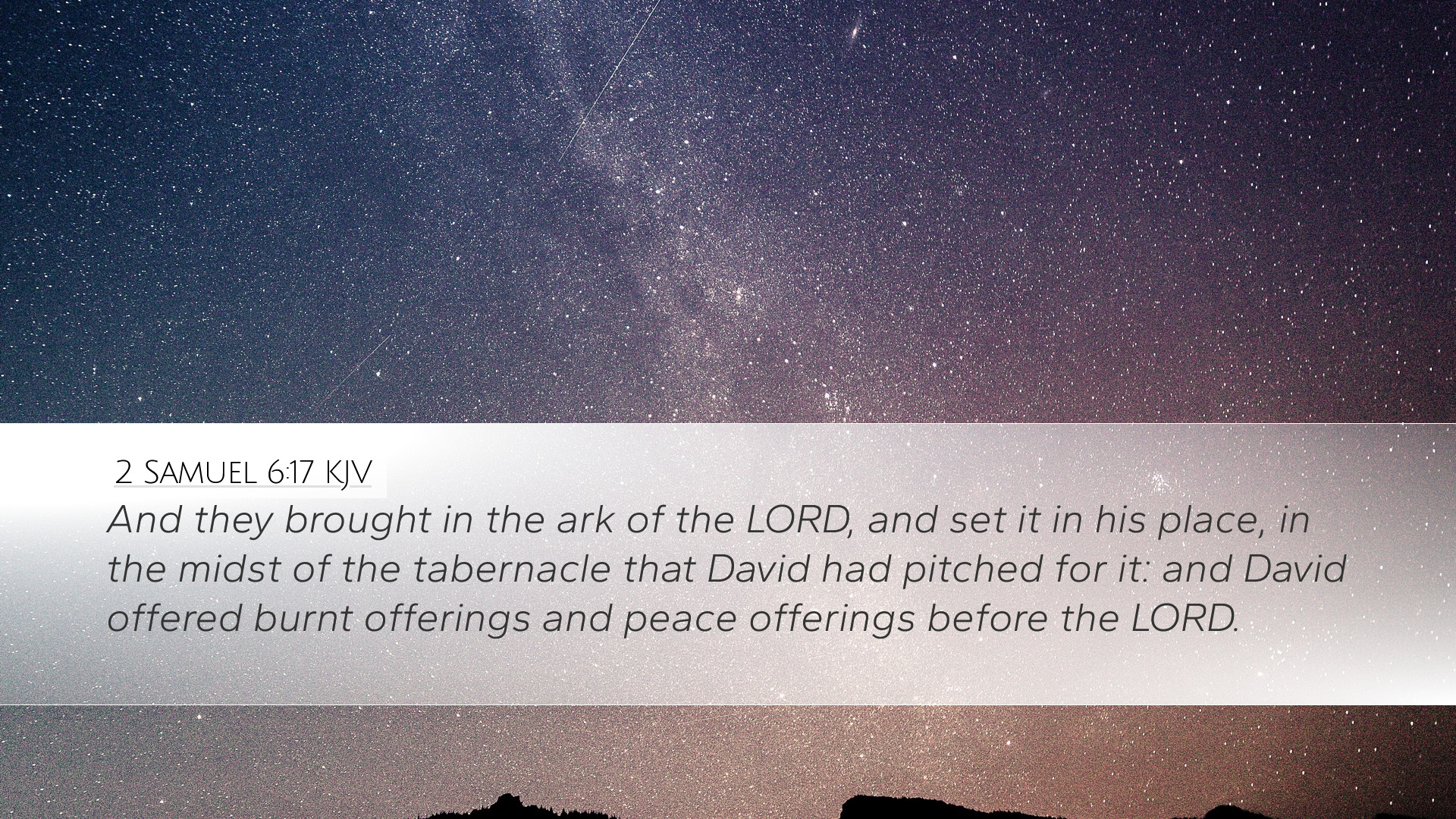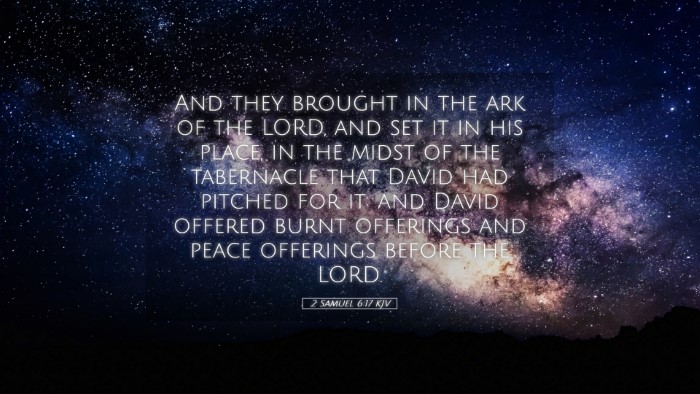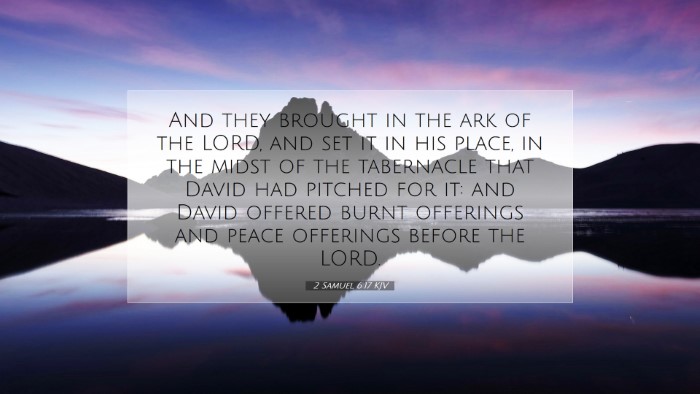Commentary on 2 Samuel 6:17
Verse Context: 2 Samuel 6:17 states, "They brought in the ark of the LORD and set it in its place inside the tent that David had pitched for it, and David sacrificed burnt offerings and fellowship offerings before the LORD." This pivotal moment in Israel's history marked the return of the ark of the covenant to Jerusalem, a significant act of worship and reconciliation with God.
Theological Significance
The Ark of the Covenant: The ark represented God's presence among His people and served as a tangible symbol of His covenant. Its placement in a city signifies not only God's choice of David as king but also a deeper theological truth about God's desire to dwell with humanity.
The Role of Worship: David’s actions—bringing the ark into Jerusalem and offering sacrifices—underscored the importance of worship in Israelite life. Worship is not merely a ritual; it is an expression of relationship with God. It reflects gratitude, devotion, and acknowledgment of God’s holiness and mercy.
Commentary Insights
Matthew Henry's Perspective
Holiness of the Ark: Matthew Henry notes the ark's holiness and the proper reverence required in its handling. The chaos prior to this verse, highlighted by Uzzah's death (2 Samuel 6:6-7), serves as a stark reminder that approaching God requires holiness. Henry emphasizes that God’s presence among His people demands both reverence and responsibility.
David's Reverence: As David sacrifices before the Lord, Henry interprets these acts as expressions of a heart dedicated to God. David’s actions set a precedent for future leaders, teaching that worship involves physical expressions of devotion and the offering of oneself to God.
Albert Barnes’ Commentary
Symbolism of Sacrifices: Albert Barnes elaborates on the sacrifices David made. He describes burnt offerings as a sign of total dedication, whereby the entire animal was consumed by fire, symbolizing complete surrender to God. This demonstrates David's recognition of God’s sovereignty and a desire for communion with Him.
Unity through Worship: Barnes also touches upon the theme of unity that the ark's return brings. By placing the ark in Jerusalem, David is unifying the tribes under worship and establishing a central place for God’s presence, fostering a community in relationship with God. This act symbolizes the Israelites’ corporate identity as God’s chosen people.
Adam Clarke’s Interpretative Lens
The Significance of the Tent: Adam Clarke discusses the relevance of the tent David pitched for the ark. Clarke suggests that through this action, David signifies a new beginning for Israel, where worship is accessible. By constructing a dwelling place for the ark, David ensures that God’s presence is among the people, encouraging them to seek Him actively.
Worship and Its Impact: Clarke also emphasizes the transformative power of collective worship. As the ark is returned, there is an implicit call to the people of Israel to remember their covenant with God and return to Him in faith and obedience. This act of worship raises the spiritual consciousness of the nation.
Historical Context
Political Dynamics: The return of the ark to Jerusalem is not merely a religious event but also a political one. David, having unified the kingdom, recognizes that the spiritual health of the nation is integral to its governance. The ark’s presence serves as a divine endorsement of David’s rule, suggesting that the nation's success hinges on its fidelity to God.
Contrast with Previous Leaders: This moment stands in stark contrast to the previous leadership under Saul, who neglected the spiritual dimensions of governance. David’s dedication to the Lord sets a biblical precedent for future rulers to prioritize their relationship with God as a foundation for their leadership.
Practical Applications
- The Call to Worship: Like David, believers are called to prioritize worship in their lives, which requires both personal and corporate expressions of faith.
- Understanding God's Holiness: The handling of the ark teaches the necessity of approaching God with reverence and understanding His holiness.
- Commitment to Unity: David's actions remind contemporary believers of the importance of unity in worship and the collective identity as God's people.
- Leadership and Faith: Spiritual leaders today can glean from David’s example the importance of integrating faith with leadership, ensuring that the pursuit of God remains central in guiding their communities.
Conclusion
This moment in 2 Samuel 6:17 encapsulates profound themes of God’s presence, worship, leadership, and community. The insights from various commentators illuminate the necessity for reverent worship, the importance of God’s covenant, and the implications of leadership reflected in David’s longing for God’s presence among His people. For pastors, students, theologians, and scholars, this verse serves as a reminder of the integral relationship between worship and life, calling them to live out their faith with the same fervor and devotion as King David.


